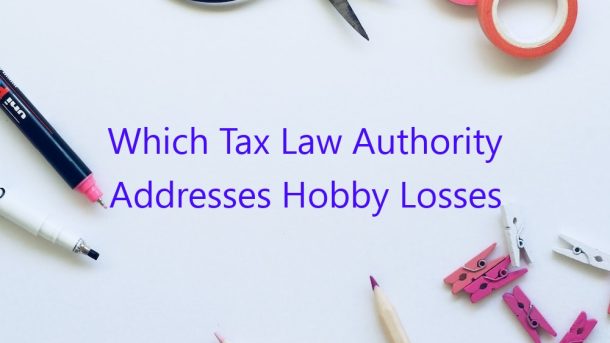In the United States, tax laws are set by the Internal Revenue Service (IRS). The authority on tax law regarding hobby losses is IRS Publication 535, Business Expenses. This publication addresses the question of when an activity is considered a hobby, and what tax implications that has.
Generally, an activity is considered a hobby if it is not carried out with the intention of making a profit. If an activity is considered a hobby, the taxpayer can only deduct expenses up to the amount of income generated from the hobby. Any losses from the hobby cannot be deducted from other income.
There are a few exceptions to this rule. If the taxpayer can show that they are engaged in the activity with the intention of making a profit, they can deduct all of their expenses related to the activity. Additionally, if the activity is considered a business, the taxpayer can deduct any losses from the activity against other income.
It is important to note that the determination of whether an activity is a hobby or a business is made on a case-by-case basis. There are no hard and fast rules that apply in every situation. If you are unsure whether your activity qualifies as a hobby or a business, it is best to speak with a tax specialist.
Contents
What is the IRS hobby rule?
The Internal Revenue Service (IRS) has a set of rules that govern how taxpayers can claim deductions for hobbies. These rules are known as the hobby rule. The purpose of the hobby rule is to prevent taxpayers from abusing the tax system by claiming excessive deductions for activities that are not really businesses.
Under the hobby rule, taxpayers can only deduct expenses for hobbies if they can demonstrate that the activity is undertaken for profit. This means that they need to show that they expect to make a profit in the future, and that they are not just engaged in the hobby for recreation or personal enjoyment.
If the taxpayer can demonstrate that the activity is undertaken for profit, they can deduct all of the expenses related to the activity. This includes expenses such as the cost of supplies, equipment, and travel. However, if the taxpayer cannot demonstrate that the activity is undertaken for profit, they can only deduct the amount of income generated by the activity. This means that they can only deduct the expenses that are greater than the income generated by the activity.
The hobby rule is a complex area of tax law, and taxpayers should seek professional advice if they are unsure how it applies to their situation.
Where are hobby losses reported?
Where are hobby losses reported?
The Internal Revenue Service (IRS) allows taxpayers to deduct hobby losses from their taxable income. However, taxpayers can only deduct hobby losses up to the amount of hobby income they earn. In order to claim a deduction for hobby losses, taxpayers must report their hobby income and expenses on Schedule C, Profit or Loss from Business.
There are a few things taxpayers need to keep in mind when reporting hobby losses on Schedule C. First, the hobby must be considered a business for tax purposes. In other words, the taxpayer must be engaged in the activity with the intention of making a profit. If the activity is not considered a business, the losses cannot be deducted from taxable income.
Second, hobby expenses must be itemized and claimed as a deduction on Schedule C. This includes expenses such as supplies, materials, and travel related to the hobby. In addition, taxpayers can only deduct hobby expenses that are not related to another job or business. For example, a taxpayer who is also a teacher cannot deduct the cost of teaching supplies from their hobby expenses.
Finally, taxpayers must report all of their hobby income and expenses on Schedule C. This includes income earned from the sale of goods or services related to the hobby. It is important to be accurate and truthful when reporting hobby income and expenses, as the IRS may audit taxpayers who claim excessive deductions.
Can you claim a loss on a hobby?
There is no definitive answer to this question since tax laws can change from year to year. However, in general, you can usually claim a loss on a hobby if you can demonstrate that you are engaged in the activity with the intention of making a profit.
There are a few things you can do to help prove that your hobby is actually a business venture. For example, keep track of your expenses and income related to the activity, and make sure you are following all applicable state and local laws regarding your hobby.
If you are able to show that you are legitimately running a business, you may be able to claim a loss on that business. However, it is important to note that you cannot claim a loss for more than you have actually invested in the activity. So, if you have lost $1,000 on your hobby, you can only claim a loss of $1,000 on your taxes.
It is also important to keep in mind that you cannot claim a loss on a hobby if you are doing it as a way to avoid paying taxes on income you have earned from a different activity. So, if you are a doctor and you have a hobby of breeding dogs, you cannot claim a loss on the dogs because you are already earning income from your day job.
Overall, whether or not you can claim a loss on a hobby depends on a variety of factors, and it is important to speak with a tax professional if you are unsure about how to proceed.
What is hobby loss tax?
What is hobby loss tax?
The hobby loss tax is a tax deduction that is available to taxpayers who have expenses related to a hobby that exceed the income that they earn from that hobby. This tax deduction is available to taxpayers who itemize their deductions on their tax return.
There are a few things that taxpayers need to know about the hobby loss tax. The first is that the expenses that are deducted need to be related to the hobby. For example, if a taxpayer spends money on supplies for a hobby, those expenses can be deducted. Another thing to note is that the income that is earned from the hobby needs to be reported on the tax return. This means that any income that is earned from the hobby needs to be included on the tax return, even if it is not taxable.
The last thing to note about the hobby loss tax is that it is only available to taxpayers who have expenses that exceed the income that is earned from the hobby. This means that if a taxpayer only has a small loss from the hobby, they will not be able to claim the deduction.
The hobby loss tax is a valuable deduction for taxpayers who have expenses related to their hobby that exceed the income that they earn from that hobby. Taxpayers who are eligible for this deduction should make sure to include any income from the hobby on their tax return and to keep track of any expenses related to the hobby.
How do I report a hobby income and loss?
Are you self-employed? Or do you make money from a hobby? If so, you need to report your income and losses to the IRS.
In general, you should report any income you earn from a hobby on Schedule C of your tax return. This includes income from selling goods or services, royalties, and investment income. You should also report any expenses related to the hobby on Schedule C.
If your hobby losses exceed your hobby income, you can deduct the losses on your tax return. However, you can only deduct hobby losses up to the amount of your hobby income. So if you earn $1,000 from your hobby, you can only deduct $1,000 in losses.
If you’re not sure whether you should report your hobby income and losses on Schedule C, contact your tax advisor.
Can hobby losses offset hobby income?
There are a number of questions tax filers ask about their taxes each year, and one of the most common is whether or not hobby losses can offset hobby income. The answer to this question is: it depends.
The first thing you need to do is determine if your hobby is actually a business. To do this, ask yourself the following questions:
1. Is the activity you are engaged in regularly carried on for profit?
2. Do you have the intention of making a profit?
3. Do you depend on income from the activity for your livelihood?
4. Do you have any expenses related to the activity that are not deductible?
5. Do you have any income from the activity?
If you answer yes to any of these questions, your hobby is likely a business.
Assuming your hobby is a business, you can offset income from the activity with losses from the activity. However, these losses are limited to the amount of income you have from the activity. In other words, you can’t use hobby losses to offset other income.
For example, if you have $1,000 in income from your hobby but also have $1,500 in expenses, you can only offset the $1,000 in income. The $500 loss cannot be used to offset other income.
If you have a net loss from your hobby, you can’t deduct it from your income. However, you can carry the loss forward to future years to offset income from the hobby.
If your hobby is not a business, you cannot use losses from the activity to offset other income. However, you can still deduct expenses related to the activity.
The bottom line is that whether or not hobby losses can offset hobby income depends on whether or not the hobby is a business. If it is, the losses can be used to offset income from the activity. If it is not, the expenses related to the hobby can be deducted.
Are hobby expenses deductible in 2021?
Income Tax Day is just around the corner, and many taxpayers are wondering if they can deduct their hobby expenses on their return. The answer is not always straightforward, as the deductibility of hobby expenses depends on a variety of factors.
Generally, taxpayers can only deduct hobby expenses if the activity is pursued for profit. In other words, the taxpayer must be able to show that he or she is engaged in the activity with the intent to make a profit. If it is not clear that the taxpayer is trying to make a profit, the expenses associated with the hobby will not be deductible.
There are a few exceptions to this rule. If the hobby is a form of gambling, for example, the expenses associated with it cannot be deducted. Additionally, if the hobby is considered a “passive activity,” the expenses associated with it cannot be deducted either. A passive activity is an activity in which the taxpayer does not materially participate.
Assuming the hobby activity is pursued with the intent to make a profit, there are a few other factors that the IRS will consider when determining deductibility. These include the amount of time the taxpayer spends on the activity, the amount of money the taxpayer has invested in the activity, and whether the taxpayer has been able to make a profit in the past.
If the taxpayer can demonstrate that the hobby is pursued with the intent to make a profit, and that the other relevant factors support deductibility, the expenses associated with the hobby can be deducted on their income tax return. However, it is important to note that these deductions will be subject to the same limitations as any other business deductions, including the 2% of Adjusted Gross Income (AGI) limit.
So, are hobby expenses deductible in 2021? The answer depends on a variety of factors, but in most cases, the answer is yes. If you are unsure whether your hobby expenses are deductible, it is best to speak with a tax professional.




